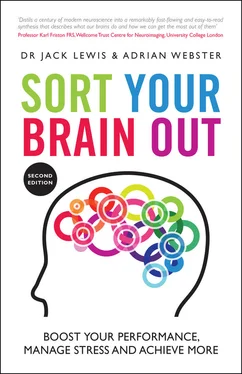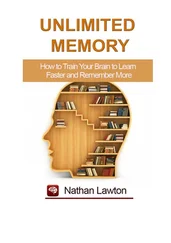Will technology ruin our brains?
To date, most of the available evidence on whether digital technology is good or bad for your brain is still in its early stages and is a bit of a mixed bag. Studies are being conducted at this very moment in an attempt to provide hard data to establish whether our obsessive use of gadgets is having unintended negative consequences. The trouble is that, with lightning‐fast changes in technology, it's a bit of a moving target. Trying to study the impact of any given type of technology is hampered by the fact that it often changes dramatically from one year to the next, as does how people actually use it. This makes it very difficult to work out exactly what causes the various changes in behaviour and brain structure. That said, a few studies have already hit the academic press from which we can start to forecast the likely future findings.
The truth is, technology in and of itself is neither good nor bad. The problems generally arise when people overuse it. Your malleable brain, as you are now more than aware, will accommodate the demands of any environment, whether it is physical or virtual in nature. The ongoing adjustments to the demands of the digital environment happen, for better or for worse, whether you like it or not, for as long as you continue to engage regularly, intensively and consistently with any given technology.
In addition to this, as we know, old habits – once formed through repetition – die hard. For instance, eating habits adopted in childhood (when metabolism is relatively high) almost always continue into adulthood (when metabolism inevitably slows down). In the absence of regular intensive exercise to burn through it, the consequent excess of calories leads to an expanding waistline – a scenario familiar to all but the most disciplined of eaters.
The same principle can be applied to technology. Once a person develops a reliance on technology, including an expectation of regular messages and online updates, any interruption to the flow of communication can lead to panic. They might find themselves throwing a hissy fit when unable to get a connection or, worse still, fall into a spiral of depression when a whole day passes by without hearing the reassuring ping of messages or seeing likes on their social media posts.
Smartphones: the adult pacifier
Many people effectively use their smartphone as a “comforter.” Just as a crying baby can be calmed down when given a dummy (aka pacifier) to suck on, many adults these days gain a similar comfort from picking up their smartphones. The trouble with this is that recent research suggests that the more people look at their phones each day, the less self‐insight they have. Personal realizations and breakthroughs in interpersonal problems usually follow periods of intense internal debate. But these internal debates simply don't happen very often if a person is constantly looking at their smartphone whenever they're alone.
With some people spending up to two months per year glued to it, a big concern for a long time was the amount of time people spent watching television. With the average household now having more screens in it than people, the latest worry is over the amount of time being devoted to computer games. With so many spending huge chunks of their lives participating, a major concern with video gaming has been that the violent nature of many titles might be leading to a new generation of morally corrupt individuals. It turns out that there is little evidence to support this.
In the case of both excessive TV watching and video game playing, the main problems revolve around displacement of time that could have been spent doing something more useful, such as socialising with friends face‐to‐face, rather than connected by microphones and headphones to enable fluid team coordination in the latest gaming craze to hit the “massively multiplayer online game” world.
A huge amount of valuable information is lost in any form of communication that doesn't do a good job of conveying a person's facial expressions and body language. This is this case when socialising through videoconferencing apps and video games, but also it also happens when socialising in person under circumstances where everyone spends most of the time looking down at screens instead of at each other's faces. Because body language is the raw material our brain circuits use to help us understand the emotions that other people are experiencing – circuitry that enables us to empathise with others – the concern is that these brain areas might not develop very well in the first place or might struggle to maintain these important interpersonal skills according to the principle of “use it or lose it.”
It's not all bad, though. There are actually several brain benefits to be had when gaming enthusiasts clock up many hours playing “first‐person” action video games (where you see through the eyes of a character as you shoot anything that moves). Brains adapt to the perceptual and cognitive demands of such virtual worlds, leading to unexpected, positive enhancements in several areas. Superior visual perception, visual short‐term memory, spatial cognition, mental rotation, multitasking and rapid decision‐making improvements have all been demonstrated, compared to an equivalent amount of video game play that doesn't involve running around shooting at fast‐moving objects.
The trouble with the youth of today
When driving in my car I often stop just down the road from where I live to let a group of teenagers coming home from school cross the road. Every time I do this, I get the distinct feeling that both my car and myself are invisible. I don't think in the past two years any of them have ever put their hand up in acknowledgement of me stopping for them or even given me so much as a nod of recognition that I exist. This worries me .
It could be that they simply lack the confidence to engage with others outside their group, particularly an adult. Maybe they just don't have the social skills to do it or perhaps common courtesy isn't particularly high up on their agenda. They appear to be so wrapped up in their own worlds that they are oblivious to everything around them. I've often thought that the possible cause of this disconnected, insular behaviour could be technology. It would be easy for me to attribute it to them being tech natives and assume their preferred mode of communication must be via email or text .
I could put it all down to technology, but then I'm always reminded of this:
“Our youths love luxury. They have bad manners, contempt for authority – they show disrespect for their elders and love to chatter in place of exercise. Children are now tyrants, not the servants of their households. They no longer rise when their elders enter the room. They contradict their parents, chatter before company, gobble up food and tyrannize teachers.”
It's a quote attributed to Socrates, the famous Greek philosopher who lived from 469 BCE to 399 BCE. It would seem that in two and a half thousand years, technology or no technology, some things just haven't changed!
– Adrian
The concerns of parents worrying that too much time spent staring at screens might ruin their kids' eyesight, on the other hand, may have been well placed. The rates of short‐sightedness, particularly in China, have rocketed over the past few decades in a manner that parallels an increasing preoccupation with screens.
That said, certain types of therapeutic video gaming are now prescribed to help people improve visual problems associated with conditions like amblyopia (aka lazy eye) and others that help middle‐aged people strengthen their eye muscles to postpone the need for reading glasses by a few years. Technology seems to forever give with one hand and take away with the other!
Читать дальше












